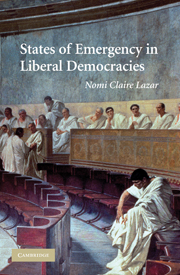Book contents
- Frontmatter
- Contents
- Acknowledgments
- States of Emergency in Liberal Democracies
- 1 The Problem of Emergency
- 2 Must Exceptionalism Prove the Rule?
- 3 Two Concepts of Liberalism
- 4 Are Rights Derogations Always Wrong?
- 5 The Rule of Law and the Roman Dictatorship
- 6 The Norms of Crisis Government
- Bibliography
- Index
4 - Are Rights Derogations Always Wrong?
Published online by Cambridge University Press: 15 September 2009
- Frontmatter
- Contents
- Acknowledgments
- States of Emergency in Liberal Democracies
- 1 The Problem of Emergency
- 2 Must Exceptionalism Prove the Rule?
- 3 Two Concepts of Liberalism
- 4 Are Rights Derogations Always Wrong?
- 5 The Rule of Law and the Roman Dictatorship
- 6 The Norms of Crisis Government
- Bibliography
- Index
Summary
Because no state can long survive if liberal values function to the exclusion of all others, states derogate rights. Nonetheless, for some, rights derogations are “a kind of blasphemy against our deepest moral commitments … even in a supreme emergency.” This chapter confronts the paradox of a necessary blasphemy. Drawing on the conclusions of the previous chapters – the dangers of exceptionalism and the possibilities inherent in a liberalism of experience – it presents a moral framework for managing this dilemma. I will argue that emergency rights derogations do not constitute exceptions from liberal democratic values, but are instead the manifestation of countervailing existential values, and in particular the value of order. Liberal values most visibly govern the day-to-day functioning of states, but states are made possible by existential ethics that relate to order. When a state is threatened its capacity to maintain order is threatened also, but because this ordering function has a moral character intrinsically connected to the rights and civil liberties it derogates, we have a second order obligation to preserve the state's capacity to fulfill its function. A liberal democratic order has no content or actuality without rights or the moral information they carry, and rights have no actuality without order. Hence, order is not a special concern in times of emergency, it functions as a value beyond these exceptional circumstances. The ethics governing the preservation of order are not exceptional but constant.
- Type
- Chapter
- Information
- States of Emergency in Liberal Democracies , pp. 81 - 112Publisher: Cambridge University PressPrint publication year: 2009

